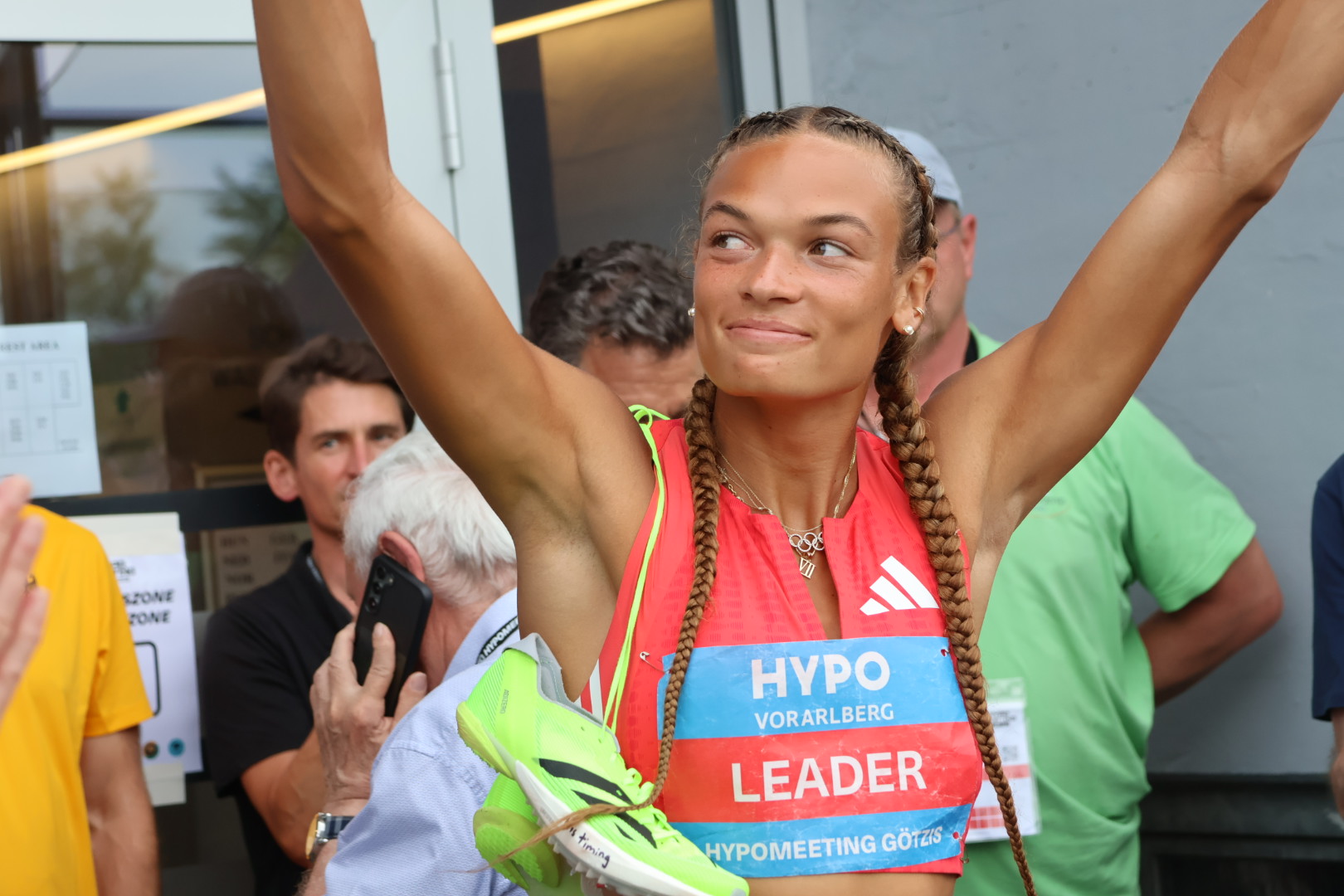Anna Hall: The Clear Favourite
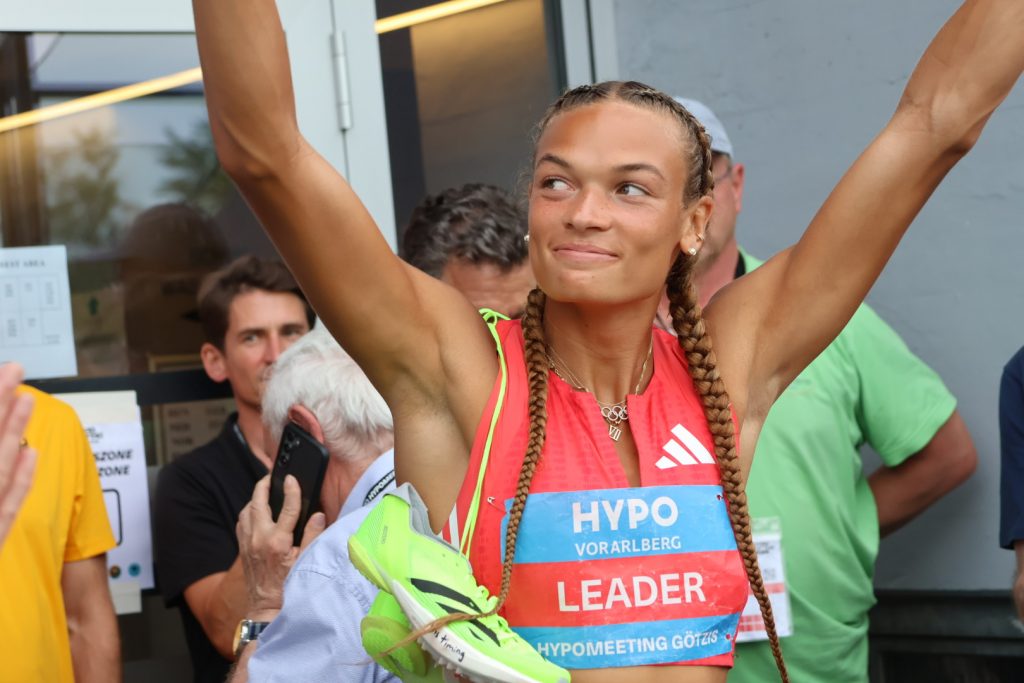
Without doubt, Anna Hall of the USA is outstanding favourite for the 2025 world championships heptathlon title. This is neither controversial statement nor hot take, but rather a simple, evidence-based conclusion on the basis of her season so far, and how that compares to the overall shape of world heptathlon in 2025.
Hall’s average heptathlon score in 2025 is 6965 points, combining the 7032 points she scored to win in Götzis on 1 June, and the 6899 points she scored to win the US championships on 1 August. Since she scored 6988 in Götzis in 2023, no-one else has come within 100 points of that mark: not in World Championships, not in the Olympics, or in any other meet.
A wander through Hall’s refreshed heptathlon profile in 2025 reveals not only that she no longer has any weak events but that all of her seven events can now be considered strong events. A glance back to that 6988 in 2023 shows a different profile, leaning more heavily on super-fast sprints, still under 14m in shot and just over 43m in javelin.
Now the 24-year-old has a 15m shot best, and a 47m javelin to add to her track speed and jumping ability. Given the nature of the heptathlon scoring tables, it is relatively harder to score points in throws than in sprints and jumps. Many athletes therefore make the judgement to focus effort in the areas with more generous reward. But that approach doesn’t work if you’re aiming for 7000 points and beyond. In those circumstances, everything needs to be optimised.
What’s remarkable about Hall’s progression is that she scored 7032 in 2025 with sprint times significantly below her series from 2023. Of course, there’s been a significant injury since then, which can have the effect of resetting what is realistic in certain events. But if Hall can have an average score of 6965 in 2025 running no faster than 13.12s and 23.37s in the hurdles and 200m respectively when her bests are 12.75 and 22.88, there’s certainly more to come. We know too that Hall is brilliant on a big stage and truly inspired when something precious to her is at stake.
Thiam and Johnson-Thompson: Legendary Rivals
But of course, while Hall might be the favourite, such status does not imply the path from bronze in Eugene through silver in Budapest to gold in Tokyo will be clear of obstacles. The shadows of triple Olympic champion Nafi Thiam of Belgium and double world champion Katarina Johnson-Thompson of Great Britain and Northern Ireland loom long on Hall’s horizon, but whether those shadows turn into something tangible is yet to be revealed.
Both Thiam and KJT have had light seasons so far, the Olympic champion dabbling in a few events in August, and the World champion peppering her summer with individual disciplines. Both withdrew from their planned competitions at the combined event majors in 2025.
Thiam jumped 6.48m at the Belgian championships, threw 51.45m a week later in javelin, and ran a 13.67m hurdles a few days after that. Her season’s best high jump of 1.81m should be viewed in the context of the torrential rain in the Lausanne Diamond League, where safety took priority. Those results are solid, if not stellar. But the triple Olympic champion has been clear that she wants Carolina Kluft’s European record – coincidentally the same as Hall’s PB of 7032 – so stellar will be the trajectory required to exceed 7000 points and beat Hall.
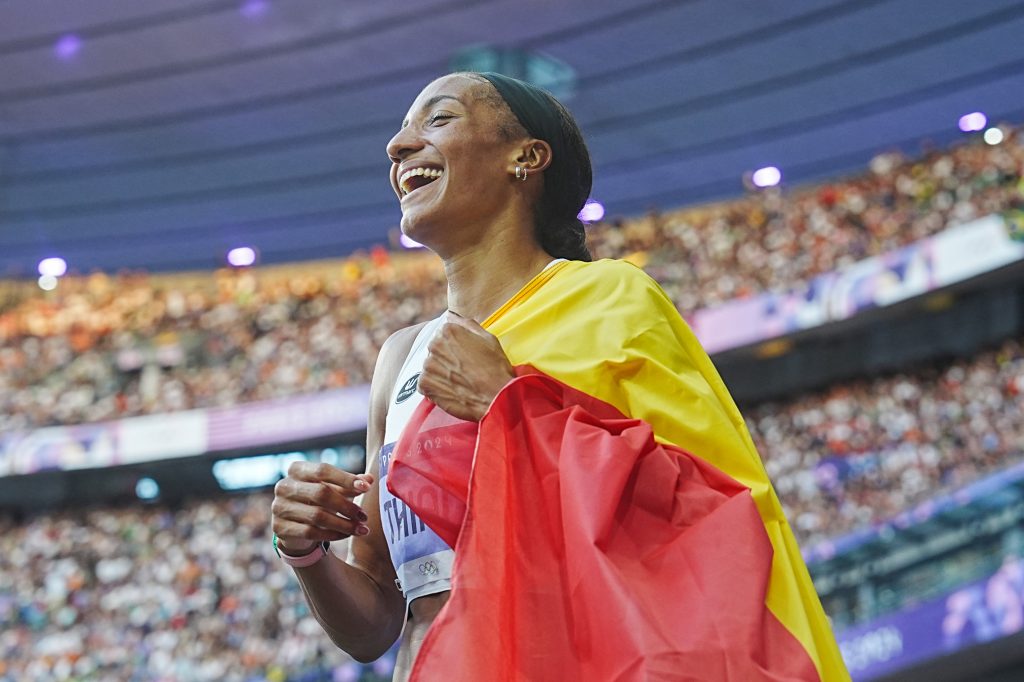
KJT has had similar results to Thiam, 6.48m at the London Diamond League and a marginally windy 13.57s hurdles in Loughborough. Add a 1.78m at the England champs and a 42m javelin at the UK champs, and the double world champion still has ground to catch up. But as she indicated at the London Diamond League press conference, if KJT is fit and healthy, she’s a contender.
However, it’s no longer the case that Thiam and KJT have only each other to beat now that Hall has set – and repeated – the standard for gold in the world championships heptathlon. Whatever performances these two all-time greats bring to the competition will need to be among the best of their long and illustrious careers. Thiam has recently had the unwelcome distraction of a dispute with her federation around access to training camp facilities, but hopefully her years of experience will help her put that to the side.
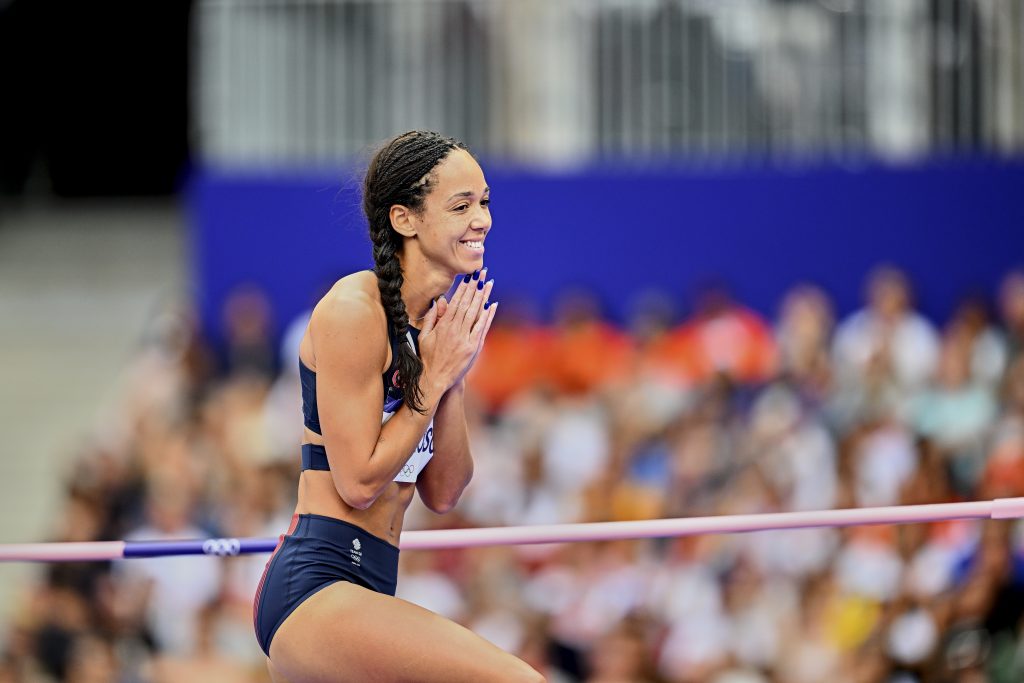
The US Squad: Depth Beyond Hall
The USA have four heptathletes in the field, their complement boosted by the wildcard for the winner of the 2024 World Athletics Combined Events Tour.
Michelle Athlerley delivered the hard work to collect points required to win the tour in 2024 and met the expectations to ensure selection at the US championships in August. But even without that cushion she was well-positioned in the world rankings, finishing third and fourth in Götzis in 2024 and 2025 respectively, and just a few points short of her 2024 lifetime best of 6465 this year.
Taliyah Brooks, second in the US trials to Hall, has stepped up significantly in 2025 both indoors and out. Indoors she scored 4669 to win bronze at the World Indoors in March (with points still left on the track) and outdoors scored 6526 at the US championships. The step up from 6400 to 6500+ is important, in part because it puts her in reach of the 6600+ scores required for a global heptathlon medal, and in part because it is in excess of the current automatic qualification score for global championships and reduces reliance on world rankings.
The fourth member of the US squad is Timara Chapman, who qualifies by way of ranking, combining her 2024 NCAA win (6339) and her 2025 indoor US title (4555). Although Allie Jones was third at the US championships in August, at the end of the qualification period Jones was two spots outside the field size quota and therefore not eligible for selection.
Qualification Pathways
As the US team’s different pathways demonstrate, qualification for the world championships heptathlon in Tokyo can be secured through multiple routes, five in all. Among those mentioned already, that includes defending champion (KJT), combined events tour winner (Atherley), auto qualification with 6500 (Hall, Thiam, Brooks) rankings (Chapman), and protected places for area champions if no other athletes from those areas have qualified through other means (subject to technical approval).
By the measure of World Athletics’ own indicator, the automatic qualification for heptathlon continues to be too high, likely skewed by the handful of athletes operating near 7000 points, and after whom there is a gap. WA’s intention is for half the field to be filled by automatic qualification, but only seven athletes – eight if we include KJT who has the score but using defending champion wildcard – qualified through that route, a mere third of the field. And as an aside, KJT – the reigning world heptathlon champion and Olympic heptathlon silver medallist – is unranked by World Athletics’ ranking system, because she does not have two eligible marks within the last 18 months.
Rising Stars: Vanninen, Dokter, O’Connor
Two of the women who have scored the automatic qualification standard and hence bring the strongest challenge in the field are the duo who dominated the indoor top lists, Saga Vanninen of Finland and Sofie Dokter of the Netherlands.
Vanninen has excelled in age group competitions over the last few years, well ahead of her competitors, but until this year had a modest sub-6400 mark in senior competition. After two 4800+ scores, one 4900+ score and a European-World double indoors, Vanninen also pushed her progress over seven events to 6563, easily winning EU23 gold in Bergen in July. The season has been one where she has successfully refocused on improving her 800m, and leaned less heavily on her heavy throw, under the eye of Estonian coach and decathlon great Erki Nool.
Tracking Vanninen all the way, also aged 22 but a few days the wrong side of the U23 age group cut-off, Sofie Dokter has similarly been collecting medals and nailing big scores. Dokter improved her indoor best to 4800+ when collecting silver behind the Finn at the European Indoors in Apeldoorn and improved her outdoor best to 6576 when finishing second to Hall in Götzis. With Anouk Vetter focusing more on javelin this year, and Emma Oosterwegel (who is also in the field) consistent but under 6500 since her bronze medal in Tokyo in 2021, Dokter has elevated herself to the position of top Dutch heptathlete.
With global championship experience now in their portfolio, and leaps and bounds of improvement yet likely given their tender age, either could be ready to pounce if any of the big three falter over seven events.
Close behind Vanninen and Dokter is Ireland’s Kate O’Connor. O’Connor appears a different athlete in 2025, her raw drive and determination maturing into a formidable combination of events. Long gone are the days where she was merely edging her way past longstanding national records: O’Connor has brought Irish combined events firmly onto a world class platform. Her improvements also started indoors, 4683 in Tallinn in February, 4781 for bronze in Apeldoorn and 4742 for silver in Nanjing. Outdoors, O’Connor chose to compete at the World University Games in Germany and improved her national record to 6487 when taking gold.
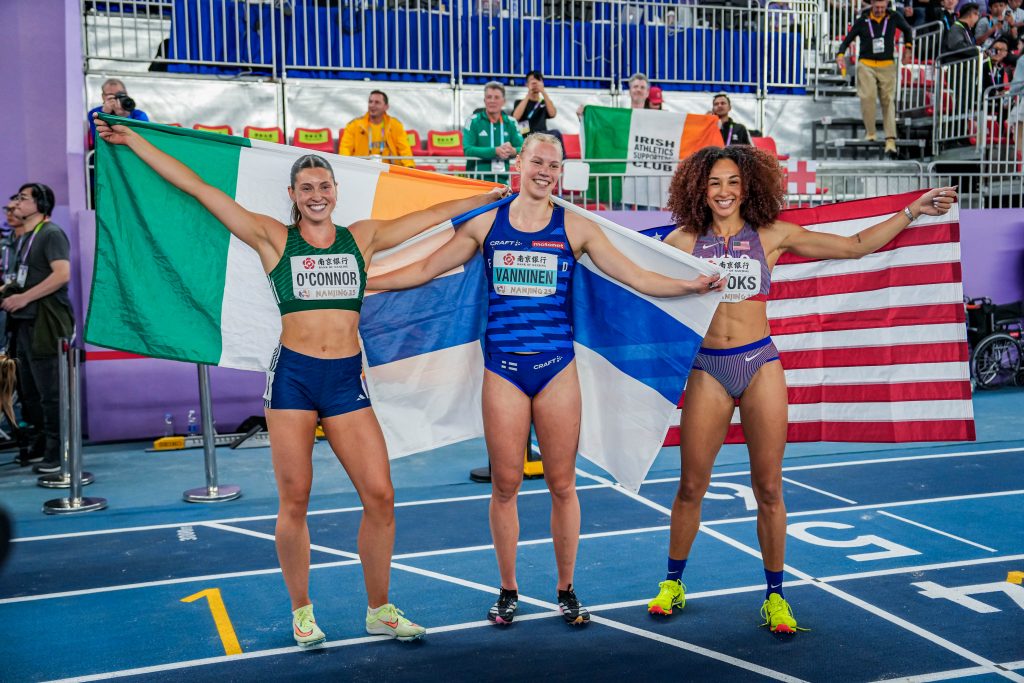
(Photo: Sonia Maletrrova for World Athletics)
In Apeldoorn, O’Connor’s bronze medal was just 30 points ahead of Great Britain’s Jade O’Dowda. Although disappointed to miss out, O’Dowda had a wonderful competition, improving her pentathlon best from 4262 to 4751, building on her improvement outdoors in 2024 to exceed 6300 for the first time with 6314 at the European Championships in Rome. Tokyo will be O’Dowda’s first heptathlon of the year, and she will want to get closer to 6500.
The third Brit in the field is European U23 silver medallist Abi Pawlett who has been improving her signature sprint hurdles throughout the 2025 season, to the extent that she was frustrated with “only” running 13.06s in Bergen (her best was 12.94s in Götzis). However, even with that personal frustration, she scored 6320 in Norway behind Vanninen and has positioned herself alongside O’Dowda over seven events. Pawlett has also improved her shot, 200m, long jump and 800m this year.
Martha Araujo of Colombia won Decastar for the second year in a row in July and has been consistently around 6400 in each of her three heptathlons this year, peaking with a South American record of 6475 in Götzis. After scoring no higher than the low 6100s for much of her career, Araujo progressed significantly in 2024, scoring 6274, 6329, 6386 and 6429 in four of her heptathlons that year. The South American champion is within touching distance of 6500 and promotion from combined events circuit podiums to global medal contender.
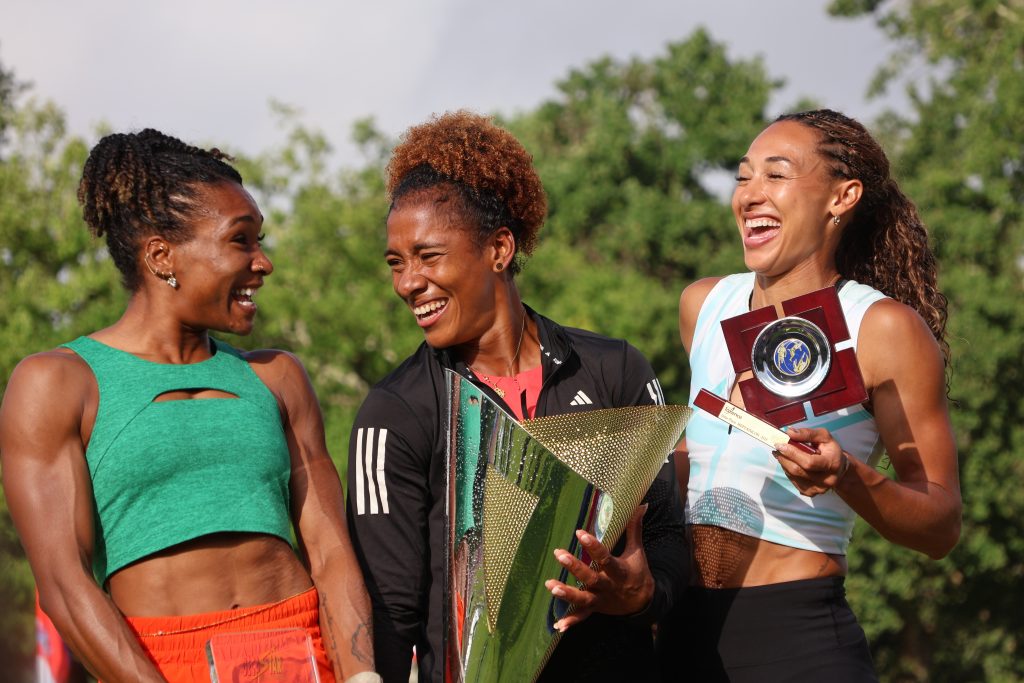
With Sophie Weissenberg still in recovery from her unfortunate injury on site at the Olympic Games in Paris, the German heptathlon squad consists of Vanessa Grimm and 2023 European U20 champion Sandrina Sprengel. Sprengel would have been a medal favourite in Bergen, having already made her mark at senior level when she won Ratingen in 2024, but was timed out of selection for the EU23s with injury. However, she bounced back to win the German championships in a new PB of 6315, which in turn anchored her qualification by ranking for the much bigger stage in Tokyo. Grimm is not yet quite back at her 6300+ form from last year but has been consistent around 6100-6200 in her two heptathlons this year, where she finished fifth at Decastar and second in Nakło nad Notecią.
Australia has two heptathletes in the field. The first is Camryn Newton-Smith who qualifies by way of her ranking position from her Oceania and Australian championships scores (6070 and PB 6180 respectively) in 2024, but also as Oceania champion. She has completed one heptathlon this year, finishing eighth at Decastar with 6017 points.
Meanwhile, Tori West had all but packed up for the season in August. She scored 6107 in April to win the Australian Championships but encountered problem after problem on the European leg of her circuit. She chased scores in Götzis, Talence, Nakło nad Notecią and braved the notorious weather of Hexham but was unable to complete a heptathlon and boost her ranking. That ranking position was based on her 6245 and 6325 scores from Götzis and Ratingen in 2024, demonstrating once again that where you deliver a score is as important as the number. After multiple aborted attempts, West found herself just outside the qualification envelope and closed her season.
But when African and Asian champions Odile Ahouanwanou and Nandini Agasara respectively did not take up their protected area champion places, the field dipped back into the rankings and West was drawn up into qualification.
Area Champions and Protected Places
As has been represented to World Athletics, protected area places – important for visibility and developing the sport – need to be in addition to the world championships heptathlon field of 24, not part of the small quota. Otherwise, the situation arises where competitive athletes are excluded in favour of those with scores hundreds of points lower, or where competitive athletes make the reasonable assumption that they will not qualify and wind up their season, only to have to reverse at speed.
Happily, in recent times in heptathlon the area champions are typically either of a standard where the athletes have a chance of qualifying in their own right or are improving athletes who will gain experience from the opportunity. But that has not been the case in decathlon (as Budapest 2023 demonstrated).
The Baltic contingent in the field includes the super-consistent Beatrice Juskevicuite of Lithuania, who scored 6295 at Mt SAC, 6040 in Götzis and 6271 in Decastar this year, as well as helping out her country in the 100m hurdles at the European Team Championships in Madrid. Estonia’s heptathlon squad continues to grow in strength, as 2023 and 2025 NCAA champion Pippi Lotta Enok makes her debut in senior global competition, fresh from her Estonian record of 6285 when winning the collegiate title. She also set a national indoor record of 4593 in February.
Maria Vicente has quietly been piecing herself back together from her distressing injury at the 2024 World Indoor championships in Glasgow. She returned to heptathlon in Götzis this year, scoring 6288, and followed that with 6295 at the Spanish championships, getting close to her national record of 6304.
Sveva Gerevini has also had a quiet year, again struggling with injury, and the Italian heptathlon and pentathlon record holder has only run an 800m outdoors since competing at the European Indoor championships in Apeldoorn. She had a solid indoor season, scoring 4498 in Clermont Ferrand and 4487 at the Euro indoors, and qualifies by way of a ranking which combines her sixth place with 6379 at the European Championships in Rome, and her 13th place at the Olympics with 6220.
Annik, Auriana and Adrianna
Alas, the Olympic fifth placer Annik Kälin will not start in the heptathlon. Like her teammate Simon Ehammer, Kalin was attempting the double of long jump and combined event. Recovering from an ankle injury a month ago, she was ready to perform in Tokyo. But during long jump warm up she described “a sharp pain” striking her ankle and following an MRI reported a combination of complex injuries.
Auriana Lazraq-Khlass had a whirlwind 2024, elevating herself from a group of solid French heptathletes around 6000-6200 into a world-class contender. Her 6635 in Rome was an outstanding breakthrough, and while she wasn’t able to repeat that at home in Paris a few months later, we now know the standard of which the artistic Frenchwoman is capable. However, she has had an unusual combination of troubles in 2025. The more typical ailment was a heel fracture, but the surprise was a mysterious tropical disease and parasite she contracted on holiday in Guyana. Lazraq-Khlass has been back in action since May, participating in various individual events in France and scoring a modest 5888 at the French championships in July.
And finally, the inimitable Adrianna Sułek-Schubert of Poland. Ada has tempered our expectations, openly and honestly describing the challenges she has encountered since returning to heptathlon after the birth of her first child. She’s encouraged us to reset her marks to post-birth performances, leaving behind that which she scored previously.
With that in mind, Sulek-Schubert has climbed her way back to 6200+, scoring 6226 at the Olympics, and mirroring that with 6287 at Nakło nad Notecią this year.
What straddles those seasons of Sulek-Schubert’s life is the sheer stubbornness she brings to her competition. The memory of her attempting to catch Hall in the 800m for bronze in Eugene endures, as does her inspired but ultimately doomed 800m in Istanbul to break the pentathlon world record, knowing that Thiam would snatch it from her a few seconds later. Adrianna’s and Anna’s careers are intertwined, and while Hall is approaching the zenith of her trajectory, there will be few who won’t wish Adrianna well as she embraces her new course.
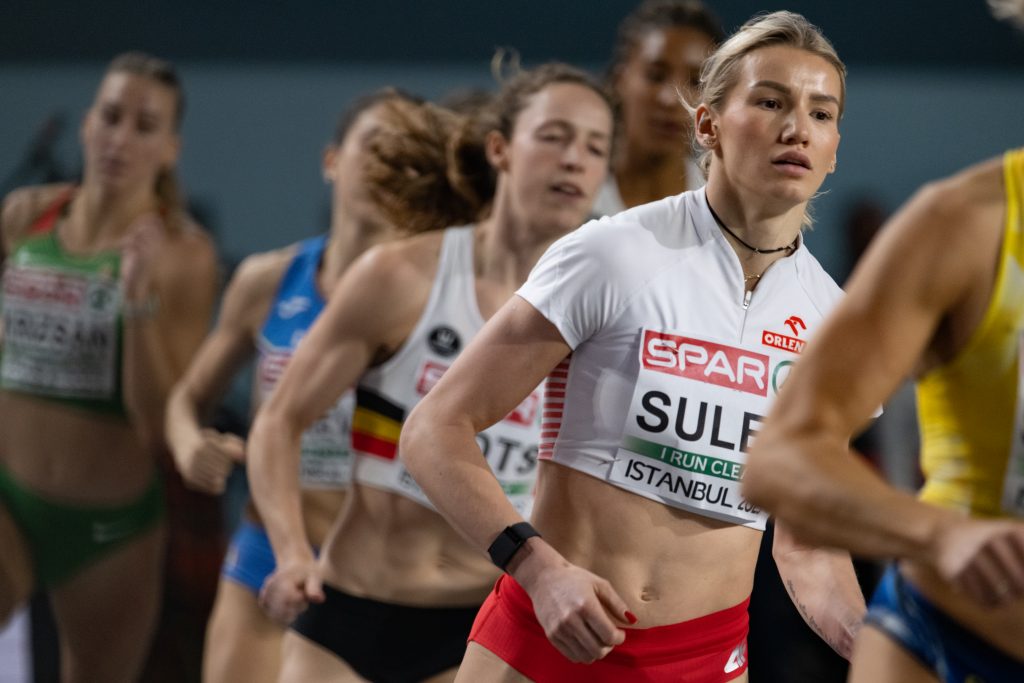
The heptathlon starts on the evening of Friday 19 September, with all four events taking place in the evening session. It’s not unusual for events to be truncated into a shorter period, but that typically takes place in the small stadia of combined events, without the lengthy process to arrive at and depart from the field of competition.
Written by Gabby Pieraccini

